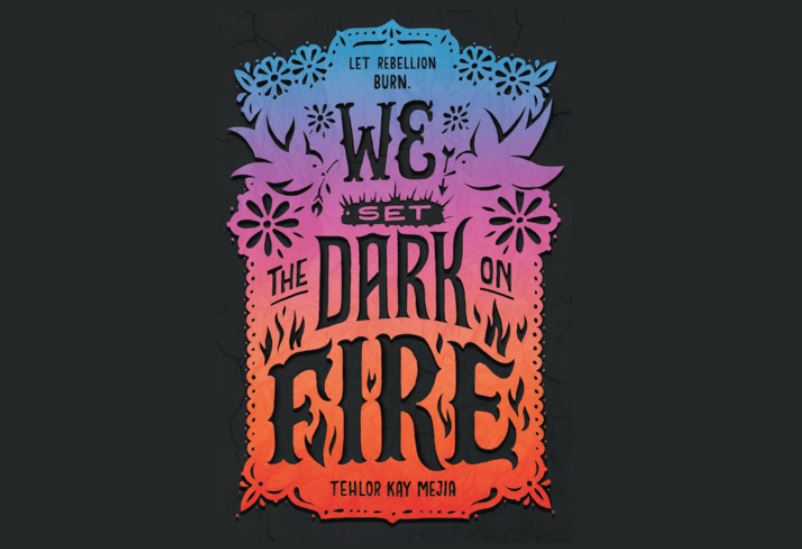Dystopian novels seem to be the highlight of YA literature. From “The Hunger Games” to “Divergent” and everything in between, stories about worlds other than our own, which could potentially become the future, entice a large audience of younger readers.
“We Set the Dark on Fire” by Tehlor Kay Mejia has taken both the dystopian genre and the YA community by storm, highlighting both queer and Latinx representation, all while depicting a story of rebellion, love and a male-dominated society.
Summary
Set in an indistinct future, the island of Medio is split in half by a wall. Individuals born on the side facing the sea receive the short end of the stick: a life of violence and starvation. Many try to escape to the “right” side of the wall to get to the capital, but they are shot down like animals as they try to cross over the wall.
Daniela Vargas was one of the few people lucky enough to survive the journey. Now living on the “right” side of the island with forged papers, she is willing to do anything she can to keep herself and her family alive. Part of that journey leads her to the Medio School for Girls, where young women are trained to become wives for wealthy members of the capital and are purchased by these families.
Marriage is not as simple in Medio, however. Each man receives two wives: a Primera and a Segunda. The Primera is supposed to be stoic and wise, serving as a partner and friend for her husband, while the Segunda is often very desirable, offering romance and childbirth. Daniela has been groomed to become a Primera for five years, and as she approaches graduation, she is one of the best.
Daniela is selected to be the Primera for Mateo Garcia, one of the wealthiest men in the capital who is rumored to become Medio’s next president. Her pairing seems less than ideal when her Segunda is Carmen, a long-term enemy who seems to be hitting it off with their new husband way too quickly. In addition to the tension between Daniela and Carmen, Mateo quickly proves himself to be quite cold and callous.
As Daniela is quickly caught in a whirlwind while transitioning into her new life, she is blackmailed by a member of a rebel group, La Voz. They threaten to expose her forged paperwork and undocumented status unless she makes a promise to spy on her new husband for the rebellion. La Voz has been at war with the Medio government for years; anyone with an ounce of suspicion or association is immediately shipped to a prison camp for their untimely death.
Suddenly Daniela is conducting regular acts of treason, trying to understand her heartless husband in order to retain information from him. While everything seems like a typical rebellion story up to this point, readers get a twist when amidst the action, Daniela finds herself falling in love with another woman.
Wrapped up in rebellion and a budding affair, Daniela has to decide what to put first: her country or her heart.
The Characters
Daniela
Even though Mejia wrote “We Set The Dark On Fire” in third person, it follows Daniela throughout the course of the book. Mejia does an excellent job at allowing readers to see into the main character’s thoughts and fears. Daniela was groomed to display no emotions whatsoever; she is almost robotic. However, inner monologue done by Mejia shows the emotional weaknesses hidden in Daniela’s character, making her much more relatable to readers.
Even though readers can clearly see that Daniela is not as tough as she appears on the surface, her performances in front of others are fascinating to watch. She has a way of manipulating every person around her into thinking she has complete control over a situation, thanks to her years of training.
Later on in the story, it is remarked that Daniela is a terrifying enemy because nobody knows what her true motives are. Taking that into account, readers notice Daniela growing more confident over the course of the book, refraining from having emotional breakdowns behind closed doors.
Carmen
Initially, Carmen appears to be shallow and condescending. But as the story progresses and her relationship with Daniela extends beyond frenemy lines, Carmen’s character becomes much more dimensional. She is the sensitive, analytical character that corresponds very well with Daniela later on in the story.
Mateo
Readers might find Mateo, the antagonist, to be terrifying due to his dash of realism. He isn’t the stereotypical villain with a cape or an army: he just has a lot of money. But with money comes power, and Mateo certainly isn’t afraid to use his power against his wives.
Mateo thrives off of making Daniela and Carmen feel powerless, which hints at the parallel, male-dominated societies in “The Handmaids Tale” and “1984,” combined with a Latinx setting.
Representation
The queer representation in “We Set The Dark On Fire” is applauded for its nonchalant attitude. As Daniela discovers her attraction to women, the pace and direction of the plot changes, but it does not completely encompass the story. This is not a stereotypical “coming out” book.
“We Set The Dark On Fire” is a book that displays queer women by simply exploring lust and attraction without the pressure of defining what is and isn’t “normal” for relationships. The market is becoming oversaturated with coming-out stories, so having a book where sexual identity is part of the character but not the entire narrative is refreshing to see.
Additionally, the heavy influence of Latinx culture and Spanish language will warm the hearts of readers who sometimes feel unrepresented in literature. With both forms of representation, Mejia has taken the foundation of YA dystopia and blown it into something spectacularly different, merging love, rebellion and friendship in ways I have yet to see as a reader.
Mejia’s work is perfect for any reader looking to get lost in a world unlike their own, or any Latinx/queer individuals looking for some wholesome representation.
















